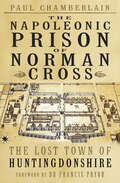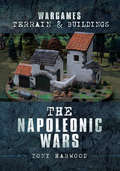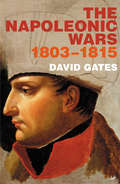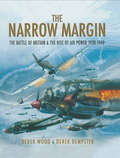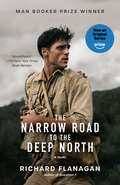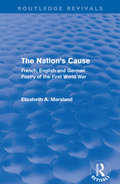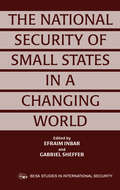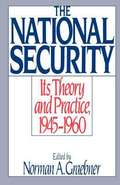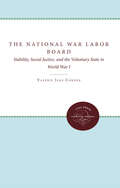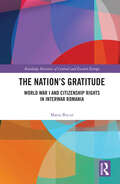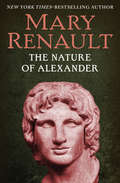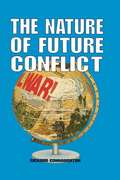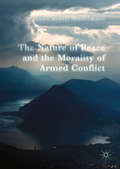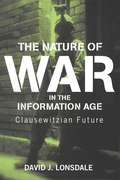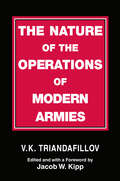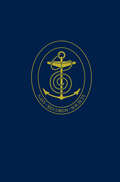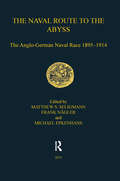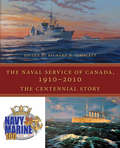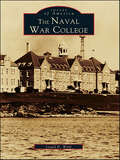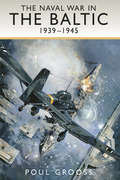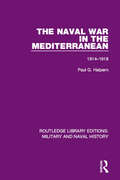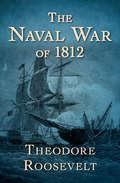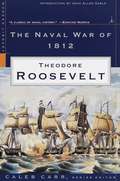- Table View
- List View
The Napoleonic Prison of Norman Cross: The Lost Town of Huntingdonshire
by Francis Pryor Paul ChamberlainNorman Cross was the site of the world’s first purpose-built prisoner-of- war camp constructed during the Napoleonic Wars. Opened in 1797, it was more than just a prison: it was a town in itself, with houses, offices, butchers, bakers, a hospital, a school, a market and a banking system. It was an important prison and military establishment in the east of England with a lively community of some 7,000 French inmates. Alongside a comprehensive examination of the prison itself, this detailed and informative book, compiled by a leading expert on the Napoleonic era, explores what life was like for inmates and turnkeys alike – the clothing, food, health, education, punishment and, ultimately, the closure of the depot in 1814.
The Napoleonic Wars (Wargames Terrain and Buildings)
by Tony Harwood&“Create good looking buildings and terrain for your gaming table,&” including a stone well, a Russian windmill, and a Peninsular diorama (Wargames and Railroads). Any miniature wargame is greatly enhanced by realistic and evocative scenery and buildings, but commercial ready-made pieces can be expensive. Building your own can be a cost-effective and very rewarding alternative, another hobby in itself, but it can be hard to know where to start. Wargames Terrain and Buildings is a series of books aimed at giving wargamers the skills, techniques and guidance they need to create their own stunning and practical model buildings. In this volume, master modeler Tony Hardwood shares his years of experience and presents the reader with a wide range of projects for the Napoleonic era. With the aid of step-by-step photographs, he guides the reader through building and finishing each of these models, which are organized in three sections of increasing complexity and encompass a range of scales and different materials. Nine projects are included but the techniques and skills demonstrated along the way, along with valuable advice on tools, construction materials and paints, can be adapted and applied to a much wider range of structures to grace your battlefields. &“This book is marvelous in so many ways. The construction of the example buildings and other structures is described step-by-step with clear photographs of each . . . The construction process is straightforward and includes some great combinations of techniques that make so much sense.&” —The Chauvinistic Blog &“[A] little masterpiece . . . All in all, a superb book.&” —Vintage Airfix
The Napoleonic Wars 1803-1815
by Dr David GatesKnown collectively as the 'Great War', for over a decade the Napoleonic Wars engulfed not only a whole continent but also the overseas possessions of the leading European states. A war of unprecedented scale and intensity, it was in many ways a product of change that acted as a catalyst for upheaval and reform across much of Europe, with aspects of its legacy lingering to this very day. There is a mass of literature on Napoleon and his times, yet there are only a handful of scholarly works that seek to cover the Napoleonic Wars in their entirety, and fewer still that place the conflict in any broader framework. This study redresses the balance. Drawing on recent findings and applying a 'total' history approach, it explores the causes and effects of the conflict, and places it in the context of the evolution of modern warfare. It reappraises the most significant and controversial military ventures, including the war at sea and Napoleon's campaigns of 1805-9. The study gives an insight into the factors that shaped the war, setting the struggle in its wider economic, cultural, political and intellectual dimensions.
The Narrow Margin: The Battle of Britain & the Rise of Air Power, 1930–1940 (Pen And Sword Military Classics Ser. #No. 22)
by Derek Dempster Derek Wood&“For vividness and a sense of the overall flow of the battle . . . The Narrow Margin is excellent for the British side.&”—Air & Space Magazine The Battle of Britain saved the country from invasion. If the RAF had been defeated all the efforts of the British Army and the Royal Navy would hardly have averted defeat in the face of complete German air superiority. With all Europe subjugated, Germany and Japan would later have met on the borders of India. This remarkable book traces the varied fortunes of the Royal Air Force in the 1930s, and shows how it readied itself for the mighty German onslaught in the summer of 1940 and won a great victory by the narrowest margins. It provides a comprehensive account of the Battle of Britain, including the day-by-day summaries of the battle. It is illustrated with photographs and maps, an appendix of the aircraft used by the Royal Air Force and by the Luftwaffe with schematic drawings, also a list of all pilots who flew in the Battle of Britain from July 10 to October 31, 1940. The authors are military aviation experts and The Narrow Margin has been published in translation in France and around the world. They also wrote A Summer for Heroes and Jane&’s World Aircraft Recognition Handbook. &“This book became the most used reference work on the Battle of Britain and formed the basis for the major feature film on the Battle . . . this entertaining book was soon accepted as the definitive title on its subject.&”—Aeroplane &“Most enlightening and useful . . . Unreservedly recommended.&”—Military Aircraft Monthly
The Narrow Road to the Deep North: A novel (Vintage International)
by Richard FlanaganNATIONAL BESTSELLER • MAN BOOKER PRIZE WINNER • A magisterial novel of love and war that traces the life of one man from World War II to the present.Available now on Prime Video: Justin Kurzel&’s highly anticipated series based on this Booker Prize–winning novel by Richard Flanagan; starring Jacob Elordi, Ciarán Hinds, Odessa Young, Olivia DeJonge and Simon Baker."Magnificent." —The New York Times Book Review "Nothing short of a masterpiece." —Financial TimesAugust, 1943: Australian surgeon Dorrigo Evans is haunted by his affair with his uncle&’s young wife two years earlier. His life, in a brutal Japanese POW camp on the Thai-Burma Death Railway, is a daily struggle to save the men under his command. Until he receives a letter that will change him forever.A savagely beautiful novel about the many forms of good and evil, of truth and transcendence, as one man comes of age, prospers, only to discover all that he has lost.
The Nation's Cause: French, English and German Poetry of the First World War (Routledge Revivals)
by Elizabeth A. MarslandAs we approach the centenary of the outbreak of the First World War, this timely reissue, first published in 1991, evaluates the function of poetry in wartime Europe, arguing that war poetry must be understood as a social as well as a literary phenomenon. As well as locating the work of well-known French, English and German war poets in a European context, Elizabeth Marsland discusses lesser-known poetry of the war years, including poems by women and the neglected tradition of civilian protest through poetry. Identifying shared characteristics as well as the unique features of each nation’s poetry, The Nation’s Cause affords new insight into the relationship between nationalism and the social attitudes that determined the conduct of war.
The National Security of Small States in a Changing World (Frcass/besa Ser.)
by Gabriel Sheffer Efraim InbarThe first part of this book is primarily devoted to analysing the impact of the system of international relations on the fortunes of small states. The second part discusses the question 'what changes in the national strategy of small states are necessary in view of the new international system?' The authors of this volume come from various parts of the world and espouse differing outlooks. Nevertheless, they were able to coalesce around a similar theme in an effort to contribute to the international understanding of the special challenges that confront the world's small states.
The National Security: Its Theory and Practice, 1945-1960
by Norman A. GraebnerBased on a conference at West Point, this volume explores the national security policies developed by the Truman and Eisenhower administrations in response to the threat of Soviet expansionism. More pointed and analytic than any other book on the subject, it shows clearly that the makers of Cold War policy were motivated by fear. It also examines the nature of U. S. security policy and points to the growing gap between the ends and the means of global security policy--the goal of protecting Western democracy from the "Red Menace" by using a nuclear strategy with limited applications. The contributors, including David Alan Rosenberg, Lloyd C. Gardner, Martin J. Sherwin, and Gary W. Reichard explore such issues as how dependence on nuclear weapons became the central doctrine of American foreign policy, the bureaucratic and political context of U. S. security, Eisenhower's ongoing disputes with Army and Navy leaders over the security issue, the objections of Democrats to the evolving security strategy, and the limits of Cold War policy, particularly how the viewing of the Third World through a U. S. -Soviet prism impeded us from developing a truly global security policy. Written in an accessible, journalistic style, The National Security makes available a wealth of information on the Cold War period and offers insights into fears that dominate political thinking to this day.
The National War Labor Board: Stability, Social Justice, and the Voluntary State in World War I (Supplementary Volumes to The Papers of Woodrow Wilson)
by Valerie Jean ConnerConner explains the background, organization, and workings of the National War Labor Board, created by President Wilson in April 1918. She analyzes the board's struggle to succeed and reveals how both labor and business attemted to use this partnership to further their own special interests. The author shows how, when dissatisfied private employers refused to cooperate voluntarily, the Wilson administration was forced to make compliance mandatory.Originally published in 1980.A UNC Press Enduring Edition -- UNC Press Enduring Editions use the latest in digital technology to make available again books from our distinguished backlist that were previously out of print. These editions are published unaltered from the original, and are presented in affordable paperback formats, bringing readers both historical and cultural value.
The Nation’s Gratitude: World War I and Citizenship Rights in Interwar Romania (Routledge Histories of Central and Eastern Europe)
by Maria BucurA pioneering work for the history of veterans’ rights in Romania, this study brings into focus the laws and policies the state developed in response to the unprecedented human losses in World War I. It features in lively and accessible language the varied responses of veterans, widows and orphans to those policies. The analysis emphasizes how ordinary citizens became educated about and used state institutions in ways that highlight the class, ethnic, religious and gender norms of the day. The book offers a vivid case study of how disability as a personal reality for many veterans became a point of policy making, a story that has seen little scholarly interest despite the enormous populations affected by these developments. Overall, the monograph shows how, in the postwar European states, citizenship as engaged practice was shaped by both government policies and the interpretation a large and varied group of beneficiaries gave to these policies. The analysis provides insights of great interest to scholars of these themes, while it offers examples of engaged citizenship useful for an undergraduate and nonspecialist audience.
The Native Soil
by Alan E. NourseExplore a Venus that never was. This is Venus as science fiction imagined it, as it might have been. Explore the hot, humid, muddy planet and meet the aliens that populate it.
The Nature of Alexander
by Mary RenaultAn &“intriguing and invaluable&” biography of Alexander the Great by the novelist whose fiction redefined Ancient Greece (The New York Times). Acclaimed writer Mary Renault is widely known for her provocative historical novels of Alexander the Great and his lovers. But she also authored this nonfiction classic, a fresh, illuminating look at a man whose legend has remained larger than life for more than two thousand years. From his dysfunctional family dynamics to his molding under Aristotle, from his shocking rise to power at age twenty to the staggering violence of his military campaigns, Renault is clear-eyed about Alexander&’s accomplishments and his flaws. Infectious in its enthusiasm, this is a penetrating study of an unrivaled conqueror, enduring icon, and fascinating man. Hailed as both &“a splendid achievement in nonfiction&” (The Plain Dealer) and &“the perfect companion to her Alexander novels&” (The Wall Street Journal), Renault&’s engrossing and accessible biography stands alone in the pantheon of Alexander the Great literature.This ebook features an illustrated biography of Mary Renault including rare images of the author.
The Nature of Future Conflict
by Richard ConnaughtonWhilst the collapse of the Soviet Union and, with it, the associated Warsaw Pact, has greatly reduced the threat of a major conflict with Europe, the story of the involvement of the United Nations in so-called 'peace' operations over the past six years makes it abundantly clear that the world-wide incidence of low intensity, intra-state conflict will remain for us as far ahead as we can see and that the resources and procedures which are essential for the success of future UN operations are yet to be produced. Richard Connaughton has already published a philosophical treatise entitled Military Intervention in the 1990s- A New Logic of War in which he validated the nine principles emerging from a study of the conduct of military interventions between 1918 and 1990 against lessons emerging from the Golf War of 1990-91. A subsequent quadripartite conference held at the British Army Staff collage found that those principles applied equally to an intra-state conflict, such as the former Yugoslavia. In this forthright and highly professional study, drawing upon those principles, Richard Connaughton seeks to 'examine the nature of future conflict and knowledge for the benefit of those called upon to make real-time decisions'. He pulls no punches, leaving the reader with a very clear understanding of the defects of our present international machinery of the maintenance of peace. He emphasises the pressing need for a new, free-range study of the UN in it's 50th year, to establish not only the comprehensive reforms to it's organisation and procedures that are so badly needed but also a clear statement of what is required of the organisation's membership as the providers of those resources, without which success is unobtainable
The Nature of Peace and the Morality of Armed Conflict
by Florian Demont-BiaggiThis book explores topical issues in military ethics by according peace a central role within an interdisciplinary framework. Whilst war and peace have traditionally been viewed through the lens of philosophical enquiry, political issues and theological ideas - as well as common sense - have also influenced people's understanding of armed conflicts with regards to both the moral issues they raise and the policies and actions they require. Comprised of fourteen essays on the role and application of peace, the book places emphasis on it's philosophical, moral, theological, technological, and practical implications. Starting with an overview of Kantian perspectives on peace, it moves to discussions of the Just War debates, religious conceptualizations of peace, and the role of peace in modern war technology and cyber-security. Finally concluding with discussions of the psychological and medical impacts of war and peace on both the individual and the larger society, this collection offers a contribution to the field and will be of interest to a wide audience. Chapters 4, 6 and 10 of this book are available open access under a CC BY 4. 0 license.
The Nature of War in the Information Age: Clausewitzian Future (Strategy and History #Vol. 9)
by David J. LonsdaleThere has been a great deal of speculation recently concerning the likely impact of the 'Information Age' on warfare. In this vein, much of the Revolution in Military Affairs (RMA) literature subscribes to the idea that the Information Age will witness a transformation in the very nature of war. In this book, David Lonsdale puts that notion to the test.Using a range of contexts, the book sets out to look at whether the classical Clausewitzian theory of the nature of war will retain its validity in this new age. The analysis covers the character of the future battlespace, the function of command, and the much-hyped concept of Strategic Information Warfare. Finally, the book broadens its perspective to examine the nature of 'Information Power' and its implications for geopolitics. Through an assessment of both historical and contemporary case studies (including the events following September 11 and the recent war in Iraq), the author concludes that although the future will see many changes to the conduct of warfare, the nature of war, as given theoretical form by Clausewitz, will remain essentially unchanged.
The Nature of the Operations of Modern Armies (Soviet (Russian) Study of War)
by V.K. TriandafillovV K Triandafillov was an outstanding young commander who shaped the military theory and doctrine of the Red Army as it came to grips with the problem of future war. A conscript soldier who rose through the ranks to become an officer in the Tsarist Army, he saw combat in both the First World War and the Russian Civil War. A student of some of the finest military specialists teaching the first generation of young Red commanders, he sought to link theory and practice by using past experience to comprehend future combat.
The Naval Air War in Korea
by Richard P. Hallion“In The Naval Air War in Korea, Dr. Hallion has captured the fact, feeling, and fancy of a very important conflict in aviation history, including the highly significant facets of the transition from piston to jet-propelled combat aircraft.”—Norman Polmar, author of Naval Institute Guide to the Ships and Aircraft of the U.S. Fleet, 18th Edition
The Naval Miscellany: Volume VI
by Michael DuffyThis seventh volume of Naval Miscellany contains documents which range in date from the late thirteenth century to the Korean War. They illustrate the many different ways in which the naval forces of the crown have served the realm. Topics covered include the role of ships in campaigns against Scotland under Edward I and Edward VI, the protection of the Iceland fishery in the days of the Commonwealth government, and the operation of prize courts during the wars against France in the eighteenth century. Moving on to the nineteenth century, the supply of timber to the Royal Navy is examined, while two contributions deal with surveying off the west coast of Africa and another prints a diary kept by a member of the Naval Brigade operating onshore in the Zulu War. The most recent contributions deal with the origins and development of the Royal Australian Navy up to the 1950s. Two more controversial subjects are also included; the first gives more information about the storage of cordite on battle cruisers in 1916 and the battle of Jutland; the second documents the relief of Admiral North from Gibraltar in 1940. There is something here for every enthusiast for naval history and for all students of the relevant periods.
The Naval Route to the Abyss: The Anglo-German Naval Race 1895-1914 (Navy Records Society Publications)
by Matthew S. Seligmann Frank NäglerThe intense rivalry in battleship building that took place between Britain and Germany in the run up to the First World War is seen by many as the most totemic of all armaments races. Blamed by numerous commentators during the inter-war years as a major cause of the Great War, it has become emblematic of all that is wrong with international competitions in military strength. Yet, despite this notoriety, ’the Great Naval Race’ has not received the attention that this elevated status would merit and it has never been examined from the viewpoint of both of its participants simultaneously and equally. This volume, which contains a comprehensive survey of the existing scholarship on this topic, both English-language and German, as well as important primary source materials from a range of archives in both Britain and Germany, fills this gap. By putting the actions of the British Admiralty side-by-side with those of its German counterparts, it enables the naval race to be viewed comparatively and thereby facilitates an understanding of how the two parties to this conflict interacted. By offering a comprehensive range of German documents in both their original text and in English translation, the book makes the German role in this conflict accessible to an English speaking audience for the first time. As such, it is an essential volume for any serious student of naval policy in the pre-First World War era.
The Naval Service of Canada, 1910-2010: The Centennial Story
by Richard H. Gimblett The Right Honourable Michaëlle JeanThis lavishly illustrated commemorative volume chronicles the full century, 1910-2010, of the Canadian Navy as a proud national institution. Known Officially until 1968 as the Royal Canadian navy and since then as the Maritime Command of the Canadian Forces, the naval service of Canada has played an important role in the development and security of our nation. The foreword for this book is by Her Excellency Governor General Michaelle Jean (as commander-in-chief of the Canadian Forces) and the contributors are highly recognized authorities on their particular period. The contributors' comprehensive coverage, drawing upon a multitude of primary archival sources and secondary volumes by other authors, includes the originals of the Canadian Navy back to 1867, both world wars, the Korean conflict, the Cold War period, and a look at the navy of the future. There is also a section on naval war art. The result is a sweeping survey history that will appeal to a broad cross-section of readers, including those who love all things navy, navy veterans and their families, historians, and librarians.
The Naval War College (Images of America)
by Lionel D. WyldExplore the history of one of the nation's most prestigious service schools in The Naval War College. It was appropriate that the U.S. Navy's pioneer training station and principal graduate college be established at Newport. Known as "The City by the Sea," Newport, Rhode Island, has a long history of maritime activity. As far back as the colonial period, Newport Harbor and Narragansett Bay have always been safe and deep havens for naval as well as commercial shipping. In 1883, Commodore Stephen B. Luce established the Naval Training Station on Coaster's Harbor Island in Newport, which became the forerunner of the modern recruit stations for enlisted men in the U.S. Navy. The next year, in 1884, Luce established the Naval War College, the first professional naval education center of its kind in the world. It soon became the U.S. Navy's premier institution for professional studies of warfare, international law, and statesmanship relating to war and peace. Among others, Luce brought to the college Capt. Alfred Thayer Mahan, the naval historian whose book, The Influence of Sea Power Upon History, 1600-1783, and other works influenced naval thought throughout the world.
The Naval War in the Baltic, 1939–1945
by Poul GroossA military historian and naval warfare expert delivers a revealing history of the Baltic Sea Campaigns and their significance throughout WWII. From the Battle of Westerplatte on the Polish coast in 1939 to the thousands of German refugees lost at sea in 1945, the Baltic witnessed continuous fighting throughout the Second World War. This chronicle of naval warfare in the region merges such major events as the Siege of Leningrad, the Soviet campaign against Sweden, the three wars in Finland, the Soviet liberation of the Baltic states, the German evacuation of two million people from the East, and the Soviet race westwards in 1945. Naval historian Poul Grooss explains the political and military backgrounds of the war in this theatre while also detailing the ships, radar, artillery, mines and aircraft employed there. He also offers fascinating insights into Swedish cooperation with Nazi Germany, the Germans&’ use of the Baltic as a training ground for the Battle of the Atlantic, the secret weapons trials in the remote area of Peenemunde, and the Royal Air Force mining campaign that reduced the threat of German submarine technology. A major contribution to the naval history of this era, Naval War in the Baltic demonstrates the extent to which the Baltic Sea Campaigns shaped the Second World War
The Naval War in the Mediterranean: 1914-1918 (Routledge Library Editions: Military and Naval History)
by Paul G. HalpernThis volume, originally published in 1987, fills a gap in a neglected area. Looking at the entire war in the Mediterrean, the volume examines the war from the viewpoint of all the important participants, making full use of archives and manuscript collections in Britain, France, Italy, Germany, Austria and the United States. A fascinating mosaic of campaigns emerges in the Adriatic, Straits of Otranto and the Eastern Aegean. The German assistance to the tribes of Libya, the threat that Germany would get her hands on the Russian Black Sea Fleet and use it in the Mediterreanean, and the appearance and influence of the Americans in 1918 all took place against a background of rivalry between the Allies which frustrated the appointment of Jellicoe in 1918 as supreme command at sea in a role similar to that of Foch on land.
The Naval War of 1812
by Theodore RooseveltTheodore Roosevelt’s landmark work of military history: The definitive account of the War of 1812. First published in 1882, The Naval War of 1812 established Theodore Roosevelt’s reputation as a noteworthy historian and scholar at just twenty-three years old. Four years later, the US Navy ordered copies of the book to be kept on every ship. With exhaustive research into all levels of the conflict, Roosevelt presented an illuminating account of the political grievances between the United States and Britain, as well as the virtues and weaknesses of ship commanders on both sides. He demonstrated an impressive understanding of naval technology, detailing weaponry and ship designs and their effects on the outcome of each battle. Refuting previous accounts of the war, Roosevelt bluntly criticized America’s military weaknesses in the face of the British fleet. Though The Naval War of 1812 initially stirred controversy in political circles, Roosevelt’s persuasive analysis inspired a movement to strengthen our national defense. This ebook has been professionally proofread to ensure accuracy and readability on all devices.
The Naval War of 1812 (Modern Library War)
by Theodore RooseveltPublished when Theodore Roosevelt was only twenty-three years old, The Naval War of 1812 was immediately hailed as a literary and scholarly triumph, and it is still considered the definitive book on the subject. It caused considerable controversy for its bold refutation of earlier accounts of the war, but its brilliant analysis and balanced tone left critics floundering, changed the course of U.S. military history by renewing interest in our obsolete forces, and set the young author and political hopeful on a path to greatness. Roosevelt's inimitable style and robust narrative make The Naval War of 1812 enthralling, illuminating, and utterly essential to every armchair historian. The books in the Modern Library War series have been chosen by series editor Caleb Carr according to the significance of their subject matter, their contribution to the fieldof military history, and their literary merit.
